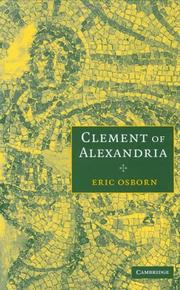| Listing 1 - 1 of 1 |
Sort by
|

ISBN: 0521837537 9780521837538 9780511734922 9780521090810 0521090814 0511734921 Year: 2005 Publisher: Cambridge: Cambridge university press,
Abstract | Keywords | Export | Availability | Bookmark
 Loading...
Loading...Choose an application
- Reference Manager
- EndNote
- RefWorks (Direct export to RefWorks)
Clement of Alexandria (150-215) lived and taught in the most lively intellectual centre of his day. This book offers a comprehensive account of how he joined the ideas of the New Testament to those of Plato and other classical thinkers. Clement taught that God was active from the beginning to the end of human history and that a Christian life should move on from simple faith to knowledge and love. He argued that a sequence of three elliptical relations governed the universe: Father and Son, God and humanity, humans and their neighbours. Faith as a fixed conviction which is also a growing mustard seed was joined to Plato's unwavering search for the best reason. The open heaven of prophecy became intelligible through Plato's ascending dialectic. This book will be invaluable in making this outstanding thinker of the early Church accessible to the students of today.
Philosophy and religion --- Alexandrian school, Christian. --- Philosophie et religion --- Ecole chrétienne d'Alexandrie --- History of doctrines --- Histoire --- Clement, --- 276 =75 CLEMENS ALEXANDRINUS --- Griekse patrologie--CLEMENS ALEXANDRINUS --- Ecole chrétienne d'Alexandrie --- Alexandrian school, Christian --- Christianity and philosophy --- Religion and philosophy --- Religion --- Alexandrian theology --- Christian Alexandrian school --- Theology, Doctrinal --- Antiochian school --- History --- Clemens, --- Clemens, Titus Flavius, --- Clément, --- Clemente, --- Klemens, --- Klēmens, --- Kliment, --- Titus Flavius Clemens, --- إكليمنضس السكندري --- Clement of Alexandria --- Klēmēs, --- Arts and Humanities --- Philosophy and religion - History of doctrines - Early church, ca. 30-600. --- Clement, - of Alexandria, Saint, - ca. 150-ca. 215.
| Listing 1 - 1 of 1 |
Sort by
|

 Search
Search Feedback
Feedback About UniCat
About UniCat  Help
Help News
News